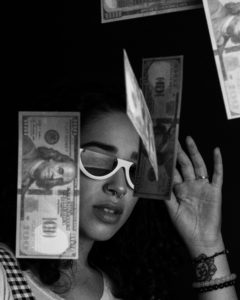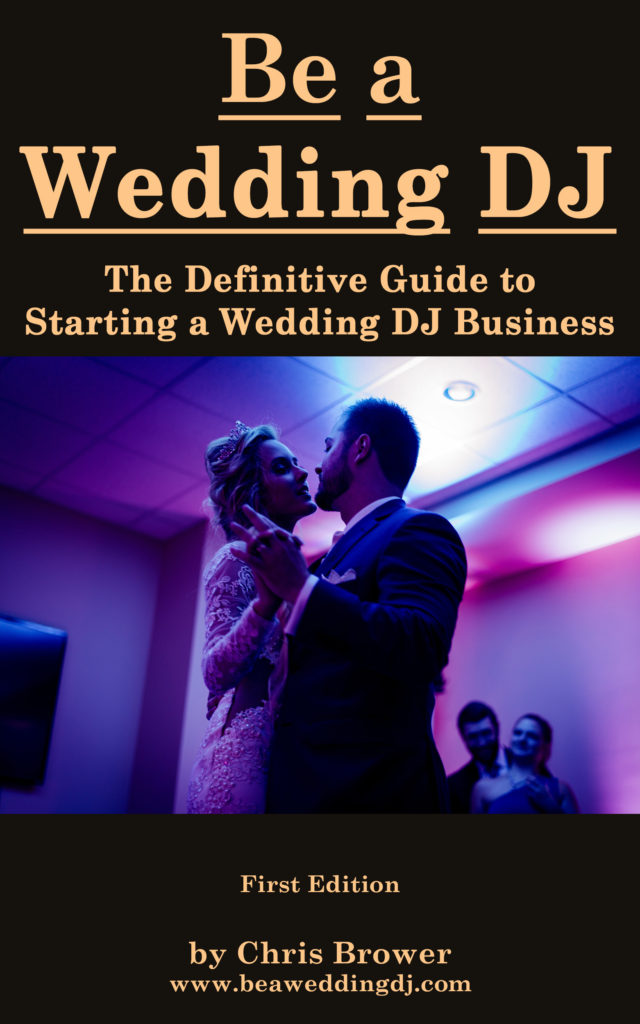How Much Money Can Wedding DJs Make?
by Chris Brower
Last Updated: February 16, 2022
Curious how to price your DJ services?
Get our eBook, Be a Wedding DJ: The Definitive Guide to Starting a Wedding DJ Business, for more tips.
Being a wedding DJ is a great way to make additional money or possibly start a new career.
The amount of money you can make is often based on several things:
- What people are willing to pay for DJ services.
- Your wedding DJ sales pitch.
- Your level of experience.
- If you work for a company or yourself.
- Specifics of the event.
- What additional services/things you can provide.
- How well you do and how generous the client is.

Okay But How Much??
Let’s say anywhere from $500-$2,000 per wedding (though certainly it could go higher). Realistically, you’re probably looking at $800-$1,500.
But that amount is based on several factors.
What People Are Willing to Pay for DJ Services
Many people planning a wedding have never planned one before. And even though everyone knows weddings are expensive, sometimes it’s still a shock just how expensive everything is – including the DJ.
As well, naturally some people have more money to spend on a wedding, while others don’t.
Some just have unrealistic expectations of what a DJ should cost. “We need a DJ for under $500.” (They may find one, of course, but it’s going to be more challenging.)
Some couples highly value the DJ and their importance in creating an amazing party, while others don’t think a DJ is that important, and thus isn’t worth much money.
You can haggle to get more bookings or hold out for what you think you deserve, but you take the risk that you don’t get a booking for that date.
Unsurprisingly, your city plays an important part. I was more easily able to get paid more in Chicago (a more expensive city in general) than Kansas City (a cheaper city in general). If you’re DJing in New York City, you can probably charge more than you could in, say, Tulsa, Oklahoma. People are used to paying more for things. They might also have more money. After all, they’re able to live in a more expensive city and have their wedding there. (Of course, this isn’t always true, as plenty of people living in expensive cities are struggling financially due to the high cost of living.)
Ready for the complete guide to becoming a wedding DJ? Here you go.

Your Wedding DJ Sales Pitch
How you sell your wedding DJ services is hugely important! An amazing wedding DJ sales pitch will help you get more jobs and make more money. It’ll also convince potential clients you’re worth a higher price.
This topic has been covered extensively in the article How to Create an Amazing Wedding DJ Sales Pitch.
If you’re not booking wedding DJ gigs (and thus, not making much money), it’s possible a big reason is that you have a bad wedding DJ sales pitch.
Your Level of Experience
The more experience and the more impressive your company is, the more willing potential clients will be to pay you top dollar.
If you’re a new DJ with hardly any reviews or experience, you can’t expect to make a lot of money at first. People might be more skeptical about hiring you in general, so a lower price will be your ticket to earn some business.
Eventually, as you do more and more weddings and get more and more good reviews from past clients, you’ll get more wedding DJ inquiries and can then feel more comfortable raising your price a bit and seeing if you can get it.
If You Work for a Company or Yourself
In most cases you’ll make more money if you work for yourself rather than for someone else’s company.
I regularly see help-wanted ads for DJ companies looking to hire new DJs for $25/hour. Hey, that’s not a bad hourly wage . . . until you realize that DJs who work for themselves (or own their own company) can easily make $150/hour or more. Yeah, six times as much – or more.
Of course, working for yourself means doing more of the work, having to build up the brand yourself, having to shoulder more of the financial burden in terms of expenses, and so on, but the financial rewards greatly, GREATLY outweigh what you can make working for someone else.
The pros and cons of working for a DJ company vs. being self-employed are discussed in-depth in the eBook, Be a Wedding DJ: The Definitive Guide to Starting a Wedding DJ Business.
Specifics of the Wedding
Is the wedding reception three hours long? Seven hours?
Are you also providing music for the ceremony?
Are you traveling a longer distance?
Does the couple have other special requests?
Many factors go into formulating a price for a DJ job. You can charge based on each event’s needs or by packages (different levels, where clients get some things but not others), or a flat rate that you typically charge for a reception no matter if it’s five hours or six hours or seven hours. Additionally, maybe you also offer discounts for military personnel, teachers, or friends/family.
What Additional Services You Can Provide
One way to make more money is to offer additional services. Some common examples include:
- Ceremony music/audio.
- Live music (such as providing acoustic guitar and vocals for the ceremony and/or cocktail hour).
- Photo booth.
- Video screens and projectors.
- Photography/videography.
- Additional lights, such as uplights*.
The list goes on and on. The more you can offer the more appealing you'll be to prospective clients and, thus, the more money you can make.
Of course, offering more also means:
- You might have additional expenses.
- More time and effort will be needed
- More equipment you'll have to bring to events.
- You might need to hire someone to provide the additional service if you can't perform them at the same time as DJing.
You can't do everything. It can get overwhelming.
For example, I tried to add a photo booth to my business. I even started buying the equipment and trying to learn it, but I increasingly realized I'd have to hire someone else to run the photo booth (so now I'd have to manage someone). There was no way I could let it run by itself, even if guests can basically press the buttons on the photo booth themselves. If I wanted an entirely self-run setup, I'd probably need fancier equipment (aka, more expensive) than I had originally assumed. I'd also have more equipment to bring and set up at each event. Etc.
Soon, the additional profit I was envisioning making got lower and lower and less enticing for the sake of my sanity. It was so stressful!
That's not to say all additional services are a bad idea. Not at all. You just have to really think about it. Weigh the pros and cons. The costs and the profit potential.
How Well You Do and How Generous the Client Is
Tips.
That's really what I'm talking about here.
Some couples will tip you automatically. $50, $100, something like that. They'll have the money ready in envelopes for all the vendors, perhaps before the reception has even happened.
Others, it will be more spontaneous. At the end of the night they'll be so thankful that they give you a tip right on the spot. It might even be higher than what they were planning (if they were planning to tip you at all).
Some couples won't tip you at all. Not necessarily because they're upset with your services, but perhaps they didn't think to. Tipping for wedding vendors isn't as automatic as it (basically) is for restaurant servers and bartenders. Plus, the couple is already paying you several hundred dollars (or maybe over $1,000) to DJ their event, so you can't be too mad.
But also, the greater you do, the more likely potential future clients (who saw you at their friend's wedding) will reach out to you for jobs, and they might even feel more adamant: "We've seen this DJ work - she's great. We have to have her!" and thus may be willing to pay more for your services.
Conclusion
So many things can affect how much money you can make at a wedding. You'll probably always be experimenting with your prices. I still am, and I've been DJing for 7+ years. Just accept that you'll probably have to start fairly low (say, $500 or $600 a wedding) but can gradually raise your prices over time.
Of course, there will eventually be a threshold where people are no longer willing to pay that much for a DJ. It's a lot of trial and error. But the more you improve your business, the more money you can possibly make.
Related Articles:
- How to Create an Amazing Wedding DJ Sales Pitch
- How to Start a Wedding DJ Business (Quick Guide)
- What Happens at a Wedding Ceremony and Reception?
- How to Promote Your Wedding DJ Business
- How to Get Tons of Five-Star Reviews
- 8 Ways to Book More Wedding DJ Gigs
- Should You Haggle Over Your DJ Prices?
- 16 Ways to Reduce the Stress of a Wedding DJ Business
- Why You're Not Booking Wedding DJ Jobs
*If you click the product links and make a purchase, we earn a commission. This helps pay for this website and other expenses. This is at no additional cost to you.
